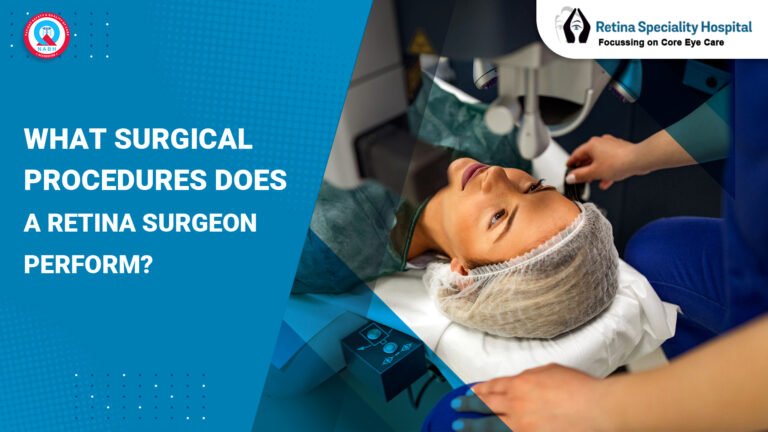Many patients often ask, “Is winter the best season for eye surgery ?” Whether you are planning LASIK, cataract removal, or advanced retina surgery, the timing of your procedure can play an important role in both comfort and recovery. With colder months around the corner, it’s natural to wonder if winter is the right time for such a delicate treatment.
The good news is that winter often offers unique advantages for patients. From reduced risks of infection to more comfortable healing conditions, the season provides a supportive environment for those undergoing eye procedures. In this blog, we’ll explore why winter can be a favorable season for various types of eye surgery, what precautions you should take, and how choosing the best retina specialist in Indore at Retina Speciality Hospital ensures safe, advanced, and successful results.
Why Season Matters for Eye Surgery
The success of any eye surgery doesn’t rely only on surgical skill—it also depends on how smoothly your eyes heal afterward. Environmental conditions like temperature, humidity, dust levels, and sunlight exposure can make a big difference in your recovery experience.
- Summer: Hot weather, sweat, dust, and high UV exposure may cause discomfort and slow healing. Patients may feel more irritation and dryness.
- Monsoon: The rainy season brings humidity, which increases the risk of bacterial or fungal infections after surgery.
- Winter: A cool and relatively dry climate often makes the recovery phase more comfortable and reduces complications
Thus, winter becomes a preferred choice for many patients considering elective procedures such as LASIK, cataract operations, or retina laser treatment.
Benefits of Winter Eye Surgery
1. Faster and More Comfortable Recovery
Cold weather helps minimize sweating and discomfort. Many patients report that their eyes feel less irritated, itchy, or dry after surgery in winter compared to summer months. This allows smoother recovery with fewer complaints of redness.
2. Lower Risk of Infection
Bacteria and germs don’t thrive as well in cooler conditions. With proper hygiene and follow-up care, the chances of developing post-surgery infections drop significantly during winter. This makes it one of the safest times for eye surgery.
3. More Time for Rest and Healing
The winter holiday season provides natural breaks for many people. Patients can schedule their surgeries around year-end holidays and get plenty of rest at home. Adequate rest is vital for faster healing and reducing risks of complications.
4. Reduced Sun Exposure
Strong UV rays can affect sensitive eyes after eye surgery. Winter offers shorter days and weaker sunlight, which protects your healing eyes from harmful exposure. With sunglasses and doctor’s advice, recovery becomes more comfortable.
5. Less Risk of Seasonal Allergies
Pollen and dust allergies are more common in spring and summer. In winter, the risk of irritation due to seasonal allergies is significantly lower, helping patients heal without added discomfort.
Common Types of Eye Surgery Performed in Winter
LASIK Eye Surgery
LASIK is a popular choice for those who want freedom from glasses or contact lenses. Since winter reduces dry-eye symptoms, patients find the post-surgery phase easier. If you’ve been waiting to correct your vision, winter is an excellent time for LASIK at Retina Speciality Hospital, the trusted Indore LASIK laser centre.
Cataract Surgery
Cataracts are common among seniors and can blur or dim vision. Many patients prefer winter for cataract surgery because recovery is smoother, and the cooler weather helps reduce inflammation and discomfort. At Indore best eye hospital, cataract procedures are performed with advanced phacoemulsification techniques, ensuring quick recovery and better vision.
Retina Surgery
Conditions like retinal detachment, macular holes, or diabetic retinopathy require urgent surgical care. Winter’s healing-friendly environment supports recovery. If you are searching for an eye retina specialist near me, Retina Speciality Hospital houses the best retina specialist in Indore, offering advanced diagnostics and treatment.
Precautions Before and After Winter Eye Surgery
Even though winter offers many benefits, patients must take some precautions to ensure a smooth healing journey:
- Stay Hydrated: Cold weather can cause dry air, worsening eye dryness. Drink enough water and use a humidifier indoors if needed.
- Use Prescribed Drops: Follow your doctor’s schedule for antibiotic and lubricating eye drops to prevent infection and dryness.
- Avoid Heaters and Direct Fans: Heaters and blowers can make the air drier. Keep your eyes protected.
- Protect from Cold Winds: Wear protective glasses outdoors to prevent irritation caused by chilly winds.
- Follow Dietary Advice: Eat vitamin-rich foods like green leafy vegetables, carrots, and omega-3 fatty acids to promote healing.
- Don’t Skip Follow-Ups: Regular check-ups at the Indore best eye hospital ensure your recovery is on track and complications are addressed early.
Choosing the Right Hospital for Eye Surgery in Indore
Your vision is priceless, and choosing the right hospital can make all the difference. At Retina Speciality Hospital, we ensure patients get world-class care combined with compassionate support.
Here’s why we are trusted for eye surgery in Indore:
- Expert Surgeons: Led by the best retina specialist in Indore, skilled in handling complex retina and refractive surgeries.
- Advanced Technology: From blade-free LASIK to high-precision retina laser procedures, we use the latest global technology.
- Comprehensive Care: Offering everything from diagnosis to surgery and post-operative management under one roof.
- Patient-Centric Approach: Each patient receives a personalized treatment plan tailored to their condition and lifestyle needs.
For anyone searching for an eye retina specialist near me, Retina Speciality Hospital is a name patients across Central India trust.
FAQs About Eye Surgery in Winter
1. Is winter the best season for LASIK?
Yes. Winter reduces dry-eye symptoms and provides a comfortable recovery environment for LASIK patients.
2. Can cataract surgery be done in winter?
Absolutely. Many seniors prefer cataract removal in winter due to smoother recovery and fewer infection risks.
3. Do I need special precautions in winter after eye surgery?
Yes. Stay hydrated, avoid direct exposure to cold winds, and use lubricating drops regularly.
4. How do I find the right hospital for eye surgery in Indore?
Choose a hospital with experienced surgeons, advanced technology, and patient-focused care. Retina Speciality Hospital is widely recognized as the Indore best eye hospital.
5. Are retina surgeries safe in winter?
Yes. With the right surgeon and hospital, retina surgeries in winter offer a favorable recovery environment and reduced risks.
Conclusion
So, is winter the right time for eye surgery? The answer is a confident yes. Thanks to cooler weather, reduced infection risks, shorter days with less sunlight, and more time to rest, winter creates a supportive environment for smooth and safe recovery. Whether you need LASIK, cataract removal, or advanced retina treatment, this season can help you heal better. At Retina Speciality Hospital, our mission is to provide exceptional care with the expertise of the best retina specialists in Indore. If you are considering eye surgery, now is the perfect time to take the step towards clearer, healthier vision. Book your consultation today at Retina Speciality Hospital and give your eyes the care they truly deserve!












